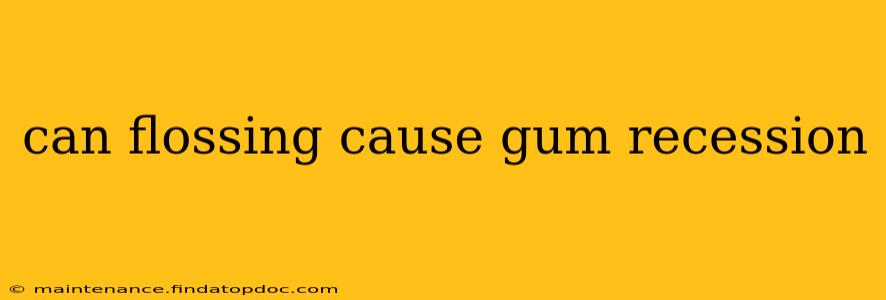Can Flossing Cause Gum Recession? The Truth About Flossing and Gum Health
The question of whether flossing can cause gum recession is a complex one, and the short answer is: it's unlikely to be the direct cause, but improper flossing technique can contribute to gum problems, including recession. Many factors influence gum health, and attributing recession solely to flossing is usually an oversimplification. Let's delve deeper into the nuances of this issue.
What is Gum Recession?
Gum recession is the process where the gum line pulls back, exposing more of the tooth's root. This can lead to sensitivity, increased risk of cavities, and even tooth loss if left untreated. Several factors contribute to gum recession, including:
- Aggressive brushing: Brushing too hard with a hard-bristled toothbrush is a significant culprit.
- Genetics: Some individuals are genetically predisposed to gum recession.
- Periodontal disease (gum disease): This is a major cause of gum recession. Bacteria build up along the gum line, leading to inflammation and tissue breakdown.
- Teeth grinding (bruxism): This puts excessive pressure on the gums.
- Hormonal changes: Pregnancy and menopause can affect gum health.
- Smoking: Smoking weakens the immune system and increases the risk of gum disease.
How Can Improper Flossing Technique Contribute to Gum Recession?
While flossing is crucial for removing plaque and food particles from between teeth, improper technique can damage the gum tissue. Here's how:
- Using excessive force: Snapping the floss forcefully between the teeth can injure the gums, leading to inflammation and potential recession. The floss should gently slide between the teeth, following the curve of the tooth.
- Sawing motion: Moving the floss back and forth in a sawing motion can also damage the delicate gum tissue. Instead, use a gentle up-and-down motion to clean each tooth surface.
- Using the wrong type of floss: Using too thick or too thin floss can make it difficult to clean effectively. Some people find waxed floss easier to use.
Is it Flossing or Something Else?
It's essential to consider other contributing factors. If you're experiencing gum recession, it's unlikely to be solely caused by flossing unless you're using extremely aggressive techniques. Other issues like underlying gum disease or aggressive brushing are far more likely culprits.
What Should I Do If I'm Experiencing Gum Recession?
If you notice gum recession, schedule an appointment with your dentist or periodontist immediately. They can diagnose the cause, assess the severity, and recommend appropriate treatment, which may include:
- Improved oral hygiene techniques: Your dentist will show you the correct way to brush and floss.
- Professional cleaning: Regular cleanings remove plaque and tartar buildup.
- Gum grafting: In severe cases, gum grafting surgery may be needed to restore the gum line.
How to Floss Properly to Avoid Gum Damage
- Use the right amount of floss: About 18 inches.
- Use a gentle touch: Avoid snapping or sawing.
- Curve the floss around each tooth: Follow the contours of each tooth to remove plaque effectively.
- Clean every tooth surface: Don't miss any!
Can I still floss if I have receding gums?
Yes, but it's crucial to do it gently and correctly. Your dentist might recommend a different type of floss or interdental brush that's less likely to cause further damage. The benefits of preventing further gum disease far outweigh the risk with proper technique.
In conclusion, while improper flossing techniques can contribute to gum problems, it's rarely the sole cause of gum recession. Addressing other contributing factors and employing correct flossing techniques is essential for maintaining healthy gums. Regular dental check-ups are crucial for early detection and treatment of any gum issues.
